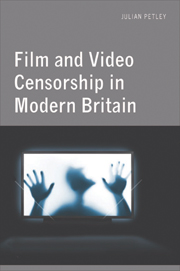Book contents
- Frontmatter
- Contents
- Acknowledgements
- Dedication
- Introduction
- Part I Censorious Rigmarole and Legalistic Overkill
- Part II After the Deluge
- Part III Nineties Nightmares
- Part IV New Millennium, New Beginning?
- 12 ‘The Way Things Are Now’: An Interview with Robin Duval
- 13 The Limits of the Possible
- 14 Full Circle
- Appendix: The DPP List of ‘Video Nasties’
- Bibliography
- Index
14 - Full Circle
from Part IV - New Millennium, New Beginning?
Published online by Cambridge University Press: 05 August 2013
- Frontmatter
- Contents
- Acknowledgements
- Dedication
- Introduction
- Part I Censorious Rigmarole and Legalistic Overkill
- Part II After the Deluge
- Part III Nineties Nightmares
- Part IV New Millennium, New Beginning?
- 12 ‘The Way Things Are Now’: An Interview with Robin Duval
- 13 The Limits of the Possible
- 14 Full Circle
- Appendix: The DPP List of ‘Video Nasties’
- Bibliography
- Index
Summary
AN UNENFORCEABLE ACT
In August 2009 it was discovered, while preparing the Digital Economy Bill, that the Video Recordings Act (VRA) had never been properly passed in the first place and thus could no longer be enforced in the UK courts! In a letter to the Director of Public Prosecutions, the Minister for Culture and Tourism, Barbara Follett, was forced to admit that: ‘It has come to light that offences under the Act are unenforceable and, accordingly, all affected current prosecutions under the Act should be discontinued and future prosecutions should not be undertaken’. The opportunities here for intense Schadenfreude were even greater than they at first seemed, as the special advisor to the Home Secretary in 1993–4 when the law was last amended (in the wake of the Bulger case) was David Cameron, and it will also be remembered from Chapter 7 that the deal which enabled this to be done was brokered by none other than Tony Blair.
The reason why the legislation had never been properly enacted is that before the Act was passed it should have been notified in draft to the European Commission (EC) in accordance with what was then Council Directive 83/189/EEC, the Technical Standards Directive, which required all technical regulations (of which the VRA is one) to be examined by the Commission and other member states to ascertain whether or not it would act as a barrier to Community trade.
- Type
- Chapter
- Information
- Film and Video Censorship in Modern Britain , pp. 197 - 212Publisher: Edinburgh University PressPrint publication year: 2011



